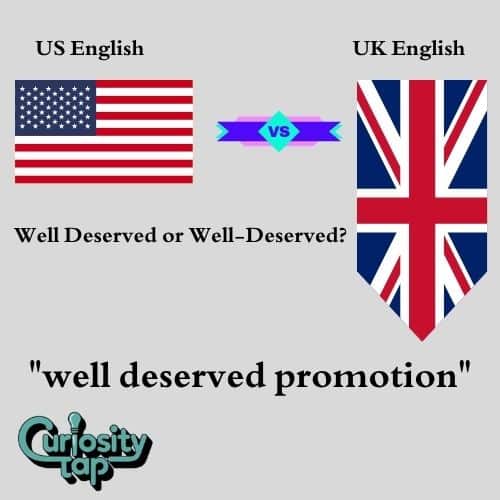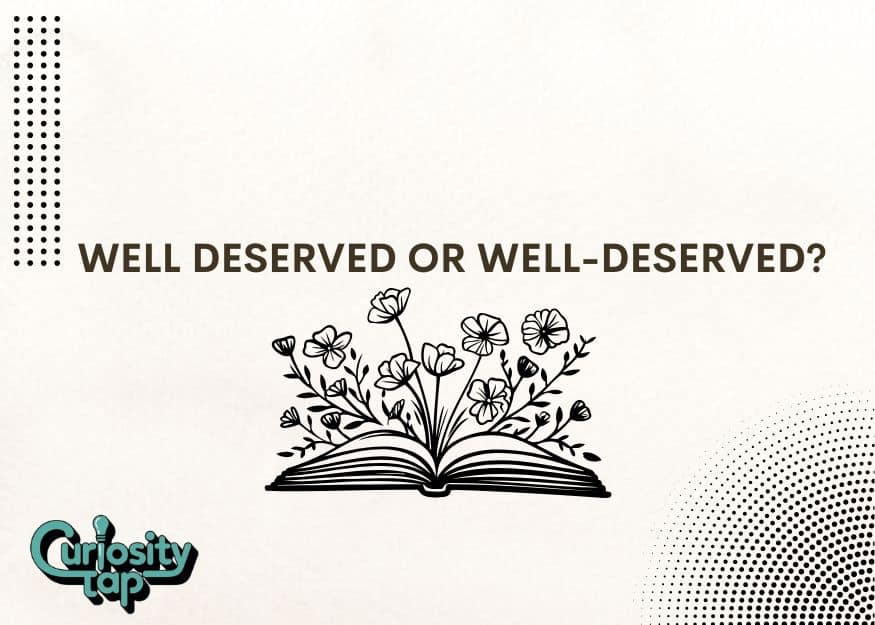You’re typing an email to congratulate Sarah on her promotion. Should you write “well deserved” or “well-deserved“? That tiny hyphen creates more confusion than a rush-hour traffic jam.
Grammar rules don’t have to feel like decoding ancient hieroglyphics. This guide breaks down exactly when to use each form, why it matters, and how to remember the difference forever.
Understanding the Hyphen Dilemma
Is well deserved hyphenated? The answer depends entirely on how you’re using it in your sentence. Think of this like choosing between sneakers and dress shoes – both are correct, but context determines which one fits.
The well deserved meaning stays consistent regardless of hyphenation. You’re expressing that someone earned something through their actions, efforts, or qualities. However, English grammar demands different punctuation based on the word’s grammatical role.
When to Use “Well-Deserved” (The Compound Adjective)
Well-deserved with a hyphen works as a compound adjective. It describes a noun directly, painting a picture of something earned through merit.
Perfect Examples in Action:
- “Marcus received a well-deserved promotion after working overtime for six months.”
- “The restaurant earned its well-deserved reputation for exceptional service.”
- “After years of dedication, Elena finally took her well-deserved vacation.”
Notice how well-deserved sits right before the noun it describes? That’s your golden rule. When these two words team up to modify a noun directly, they need that hyphen to show they’re working together.
Why the Hyphen Matters Here
Without the hyphen, readers might stumble. “Marcus received a well deserved promotion” could momentarily confuse someone. Are we talking about something that’s “well” and separately “deserved”? The hyphen eliminates that split-second of uncertainty.
Think of compound adjectives like well-known, first-rate, or high-quality. They follow the same pattern – multiple words combining forces to describe something specific.
When to Use “Well Deserved” (The Standalone Expression)
Well deserved without a hyphen shines when it stands alone as a complete thought or follows a linking verb. You’re making a statement rather than describing a noun.
Clear Examples:
- “That award was well deserved.”
- “Your success is well deserved, Jennifer.”
- “The applause? Well deserved.”
Here, you’re not describing a specific noun. Instead, you’re making a judgment about something that already happened or exists. The phrase works independently, so no hyphen needed.
The Grammar Behind the Madness
Well deserved or well-deserved confusion stems from compound modifier rules. English loves creating compound adjectives by smashing words together with hyphens. But when those same words stand alone, they don’t need that connector.
The Technical Breakdown:
Compound adjective (pre-noun): Requires hyphen
- “She gave a well-deserved speech.”
Predicate adjective (post-verb): No hyphen needed
- “Her speech was well deserved.”
Standalone expression: No hyphen
- “Well deserved, Michelle!”

Regional Differences: US vs. UK English
Here’s where things get interesting. Both American and British English follow the same basic rules for well deserved vs. well-deserved. However, UK English tends to use fewer hyphens overall in compound adjectives.
Some British publications might write “well deserved promotion” where Americans would definitely hyphenate “well-deserved promotion.” But the predicate adjective rule remains consistent – “it was well deserved” works everywhere.
Memory Tricks That Actually Work
The “Before or After” Test
Ask yourself: Does well deserved come before the noun it describes? Add the hyphen. Does it come after a linking verb like “was,” “is,” or “seems”? Skip the hyphen.
The Substitution Method
Try replacing the phrase with “earned” or “merited.” If it works smoothly, you’re probably dealing with a predicate adjective (no hyphen). If it sounds awkward, you likely need the hyphenated compound adjective.
Common Mistakes to Dodge
Mistake #1: Hyphenating Everything
Wrong: “The recognition was well-deserved.”
Right: “The recognition was well deserved.”
Mistake #2: Never Using Hyphens
Wrong: “She received well deserved praise.”
Right: “She received well-deserved praise.”
Mistake #3: Inconsistent Usage
Pick a style guide and stick with it. Don’t switch between forms randomly within the same document.
Real-World Applications
Professional Communications
Email example: “Congratulations on your well-deserved promotion, David. Your dedication was well deserved of this recognition.”
Performance review: “Tom’s well-deserved raise reflects his consistent excellence. The team’s response was well deserved.”
Academic Writing
Research paper: “The study received well-deserved attention from the scientific community. Such recognition was well deserved given the groundbreaking methodology.”
Similar Expressions to Master
Understanding well deserved helps with related phrases:
- Well-earned vs. well earned
- Hard-fought vs. hard fought
- Much-needed vs. much needed
The same rules apply. Compound adjective before a noun? Add the hyphen. Standing alone or after a linking verb? Leave it out.
Quick Reference Guide
UsageExampleRuleBefore nounwell-deserved successHyphen requiredAfter linking verbSuccess was well deservedNo hyphenStandalone"Well deserved!"No hyphenExclamation"Well deserved, Sarah!"No hyphen
Putting It All Together
Well deserved and well-deserved aren’t interchangeable decorations you can sprinkle randomly through your writing. They serve specific grammatical purposes that help readers understand your meaning instantly.
The compound adjective well-deserved works hard to describe nouns directly. It’s like a spotlight highlighting exactly what earned recognition. The standalone well deserved makes broader judgments about fairness and merit.
Frequently Asked Questions
Is there a hyphen in well deserved?
Sometimes. Use well-deserved with a hyphen when it directly modifies a noun. Use well deserved without a hyphen when it stands alone or follows a linking verb.
How do you say well deserved to someone?
Simply say “Well deserved!” as congratulations. You can also say “That was well deserved” or “Your [achievement] was well deserved.”
Is it well-earned or well-deserved?
Both exist but mean slightly different things. Well-deserved focuses on merit and fairness. Well-earned emphasizes the effort someone put in. “She received a well-deserved promotion” vs. “She received a well-earned promotion.”
Can I use both forms in the same sentence?
Absolutely! “Patricia’s well-deserved recognition was well deserved after her tireless community service.”
Final Thoughts
Remember, mastering well deserved vs. well-deserved isn’t about memorizing complicated rules. It’s about understanding how these words function in your sentences. Practice with real examples, and soon you’ll use both forms naturally and confidently.
Read more knowledgeable blogs on Curiosity Tap
Is this article helpful?

Jackson Pearson is a passionate educator and language enthusiast behind the blog Jackson Pearson. With years of experience in teaching and writing, he specializes in simplifying complex grammar rules, breaking down tricky vocabulary, and crafting learning guides that are both engaging and practical. His mission is to help readers boost their English skills whether they’re beginners or brushing up for fluency. Through every article, Jackson brings clarity, structure, and a spark of curiosity to the world of English learning.



